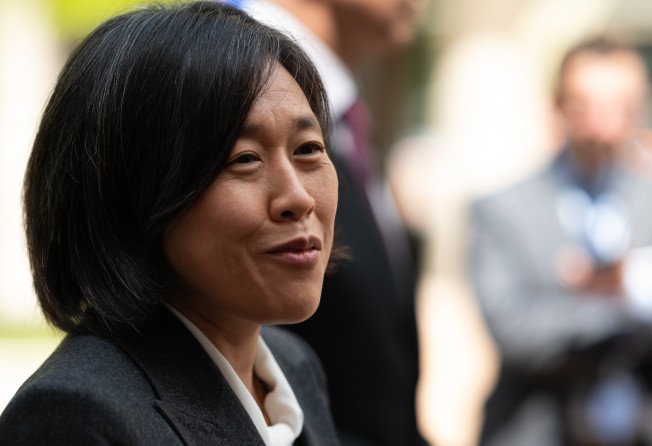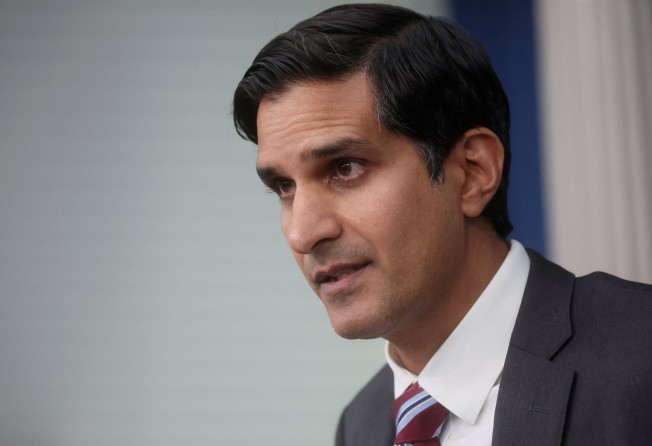
US could lower China tariffs to combat inflation, White House adviser suggests
- Trump-era duties on items like bicycles and underwear serve no strategic purpose, says national security official Daleep Singh
- There may be an ‘opportunity’ to look into the import duties amid rising prices and China’s own supply chain concerns, he notes

Washington is weighing a reduction of tariffs on non-strategic goods from China such as bicycles and apparel, a White House national security official said on Thursday, as part of efforts to combat soaring inflation.
“While they may have created negotiating leverage, they serve no strategic purpose,” Daleep Singh, deputy national security adviser for international economics, said of the tariffs imposed on Chinese imports during the trade war that began in 2018.
“Our opportunity … is to reframe the purpose of these tariffs so that they’re advancing real, strategic priorities of the United States,” Singh said at an event hosted by the Washington-based Bretton Woods Committee.
Such a move would maintain tariffs on goods connected to critical supply chains, foundational technologies and national security but reduce duties on things like bicycles, apparel and underwear, he said.

Singh also suggested that the arrangement could have a mutual component, whereby China could move to lift some of its own non-strategic tariffs on US imports given Beijing’s “very serious supply chain concerns” caused by the economic fallout of its zero-Covid strategy.
Along with a host of other China-related measures, US President Joe Biden’s administration has largely kept intact the approach to trade with China it inherited from former president Donald Trump, including the tariffs on some US$300 billion worth of Chinese imports.
Apart from some targeted exemptions the Biden administration reinstated in March, a proactive, strategic cut in tariffs such as those mentioned by Singh would be the first substantial US effort to narrow the trade war’s scope.
There is appetite among US lawmakers for a reduction in tariffs, including from Republicans.
At a House Ways and Means Committee hearing with US Trade Representative Katherine Tai last month, Representative Chris Smith, a New Jersey Republican, said: “An important aspect of effective policies to address China’s non-market and unfair trade practices is regular review of any tariffs imposed on imports from China to make sure that they are serving their intended purpose.”
He also called on the US Trade Representative’s Office to offer exemption applications for all tariffs.
Tai acknowledged at that hearing that it was time to “turn the page on the old playbook” when it came to confronting China, saying it was clear that China did not intend to make any “meaningful reforms” to address long-standing US concerns about its economic model.
Talks with China about the “phase one deal” it signed with the Trump administration in 2020 have been “unduly difficult”, said Tai, adding that the US should not “wait for China to change”.
Instead, she said, the US should focus on bolstering its competitiveness by strengthening domestic manufacturing, investing in sectors such as clean energy and incentivising companies to source American-made goods.
The Biden administration believes Chinese President Xi Jinping’s growth strategy is likely to remain underpinned by a focus on state-owned enterprises and continued deployment of government subsidies, Singh said on Thursday.
But even as he indicated some potential for a mutual reduction in tariffs, Singh said that Beijing appeared willing to take strategic risks as Xi sought to “achieve supremacy, primarily through economic and technological primacy,” citing comments by Chinese officials about the decline of Western democracies.
That was not necessarily a bad thing, said Singh, pointing to the potential for a “race to the top” that could spur indigenous innovation, public investment and workforce deployment. “But no doubt it’s also going to involve economic frictions,” he said.
Additional reporting by Robert Delaney